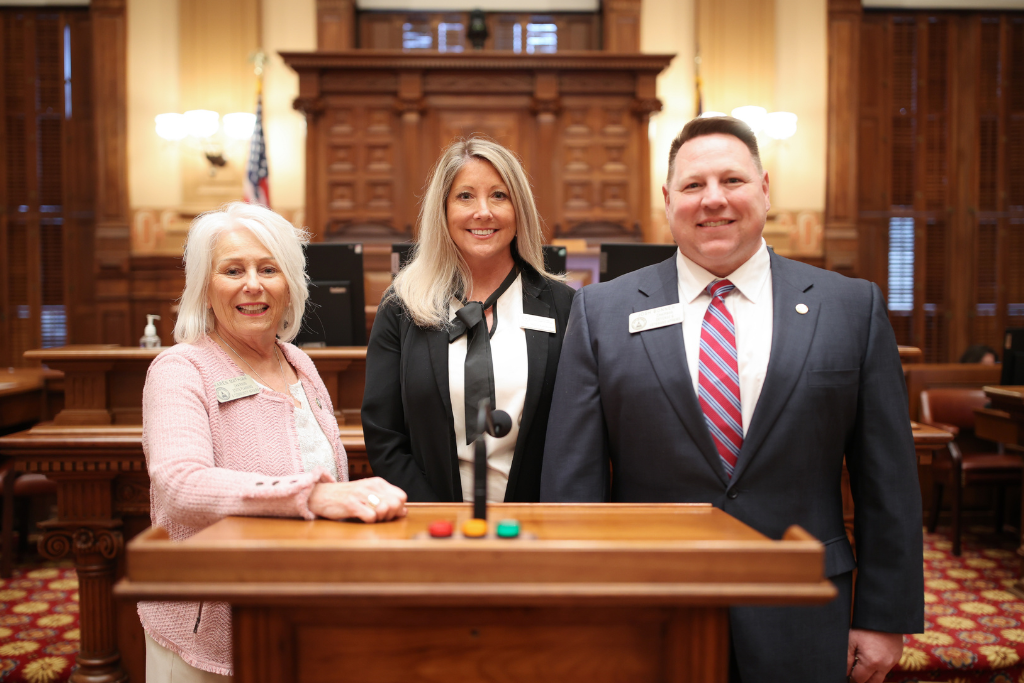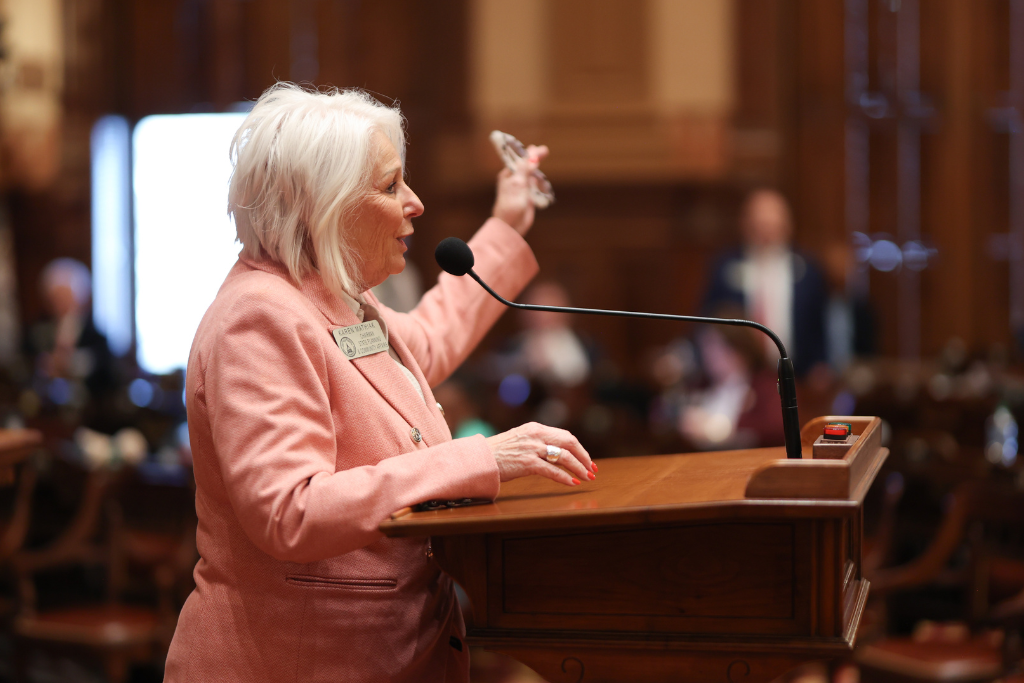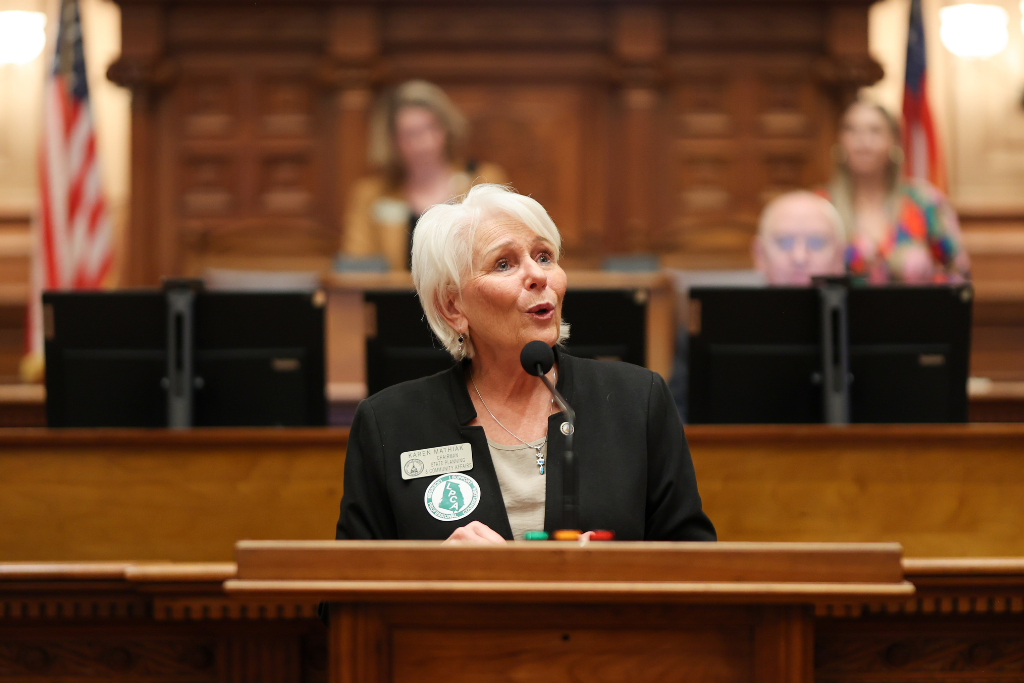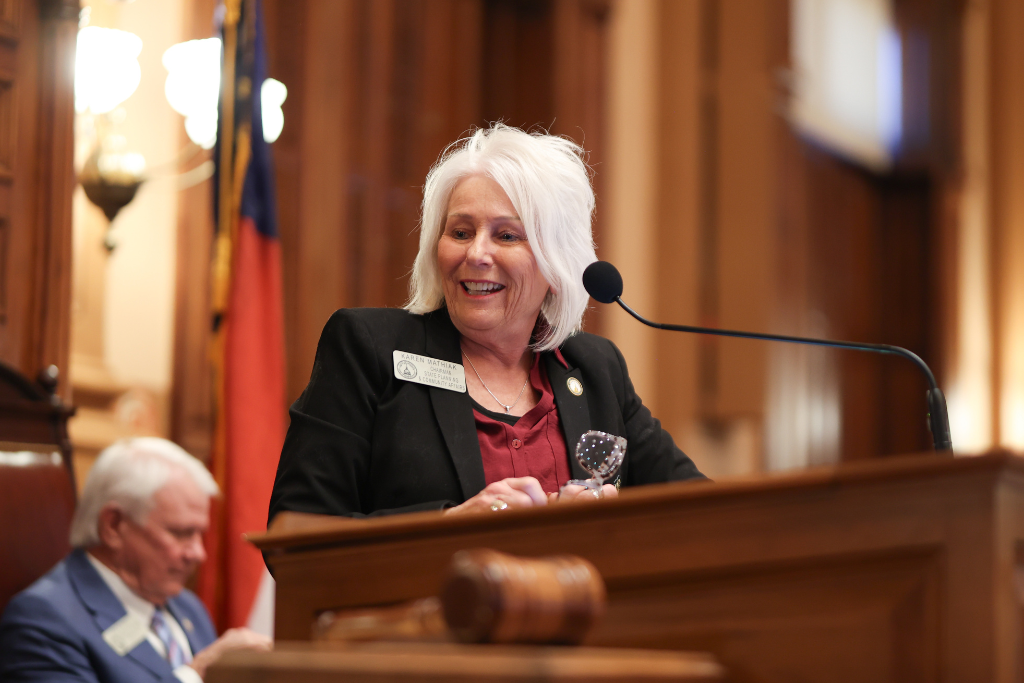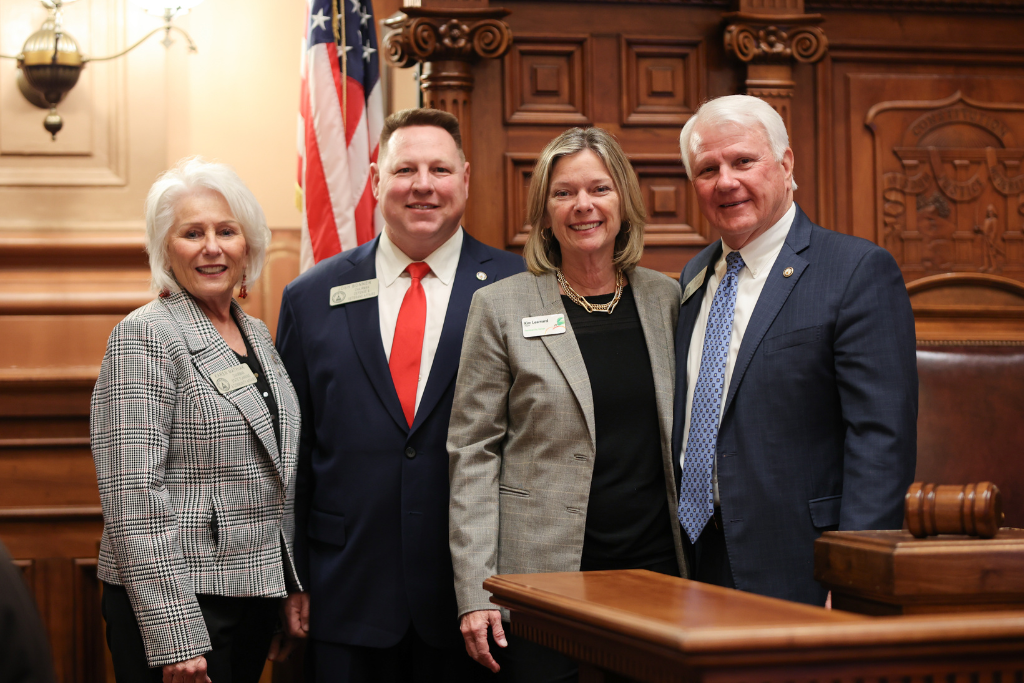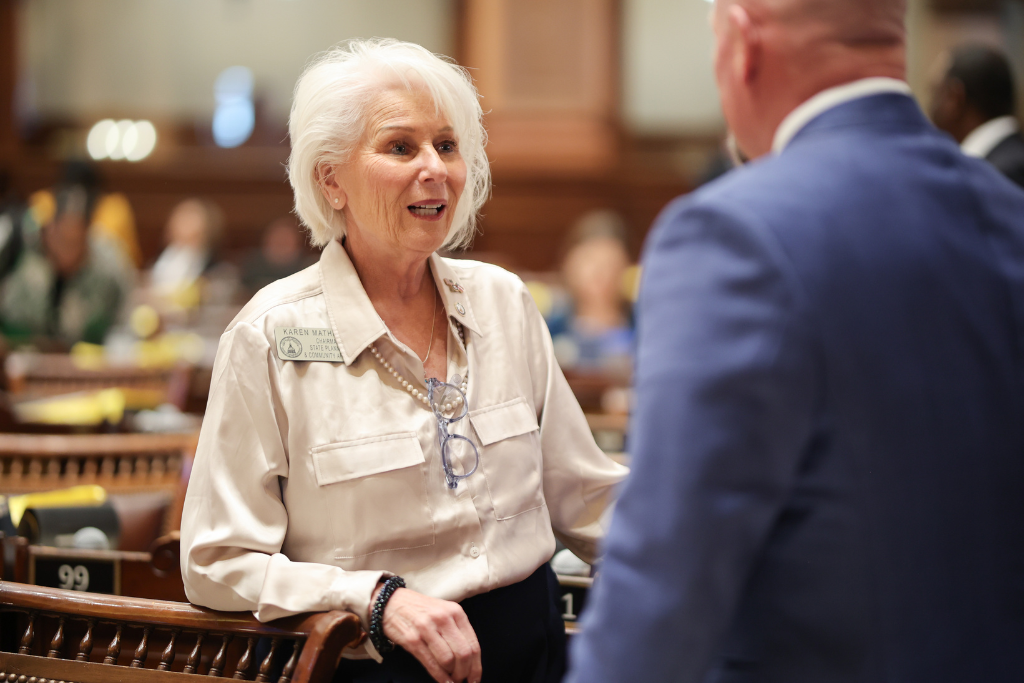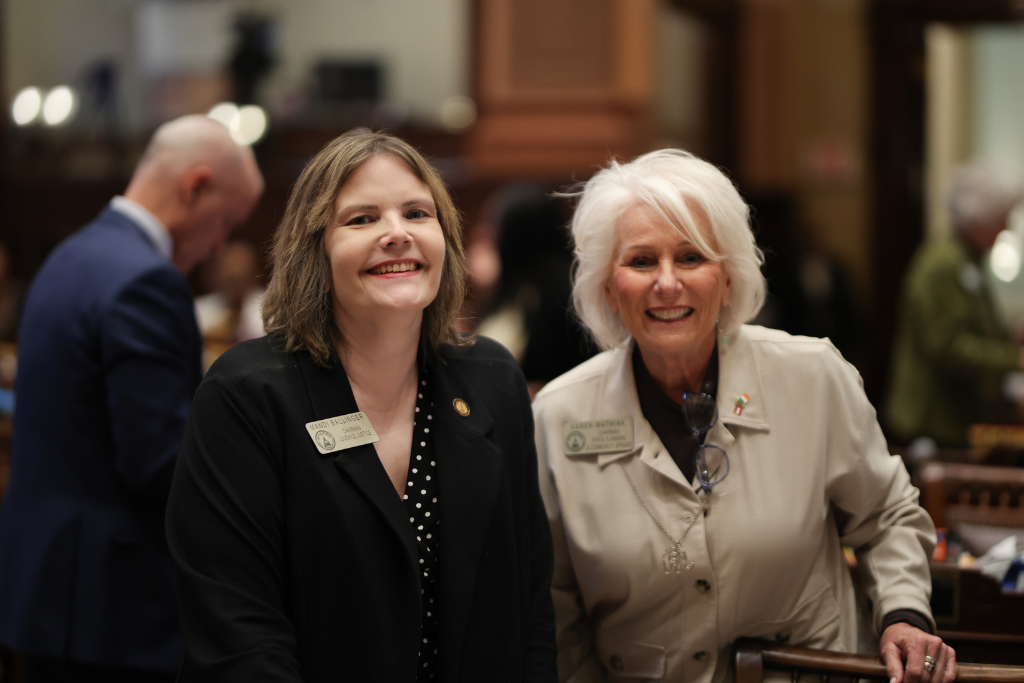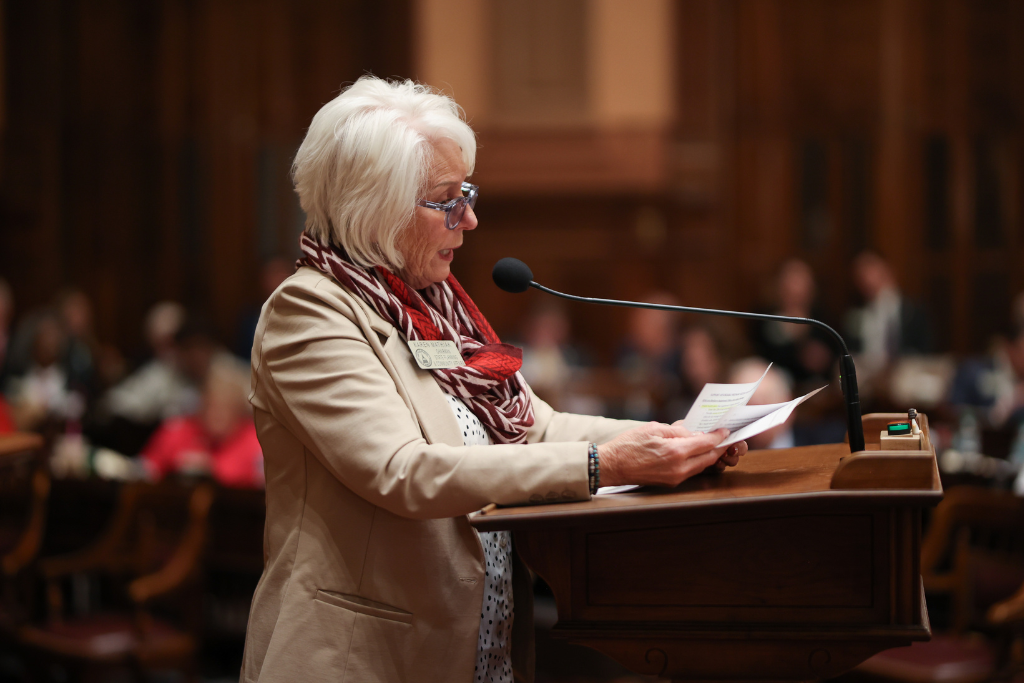Week 9 Legislative Session Recap 2023
March 6th - March 10, 2023
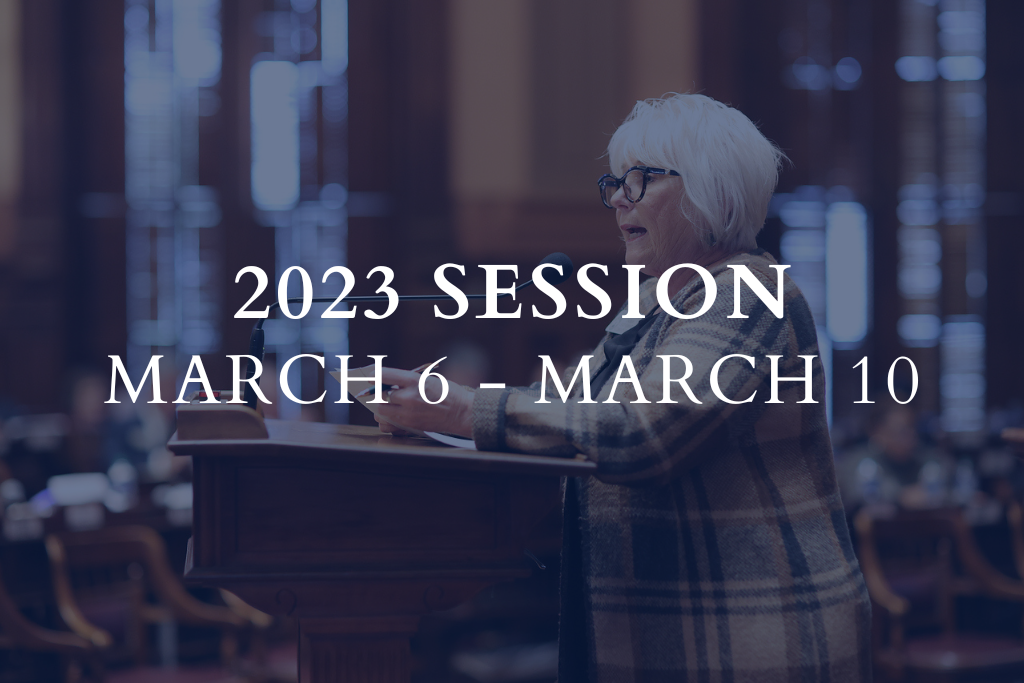
The Georgia House of Representatives reconvened for the ninth week of session and Legislative Day 28, otherwise known as Crossover Day, on Monday, March 6, 2023. Crossover Day is a crucial deadline for the House and Senate as this is the last day for bills to pass out of their chamber of origin in order to remain eligible for consideration this session, and as a result, the House took up legislation well into the night to send to our Senate counterparts. By the time we adjourned just before midnight, my colleagues and I passed more than 50 bills and resolutions in one day. Following Crossover Day, we continued to convene on the House floor throughout the week, where we passed a balanced state budget for the next fiscal year and heard Georgia Supreme Court Chief Justice Michael P. Boggs deliver the State of the Judiciary address.
Fiscal Year 2024 Budget – Sent to the Senate
Each legislative session, the General Assembly has a constitutional obligation to pass a balanced state budget, and this week, the House of Representatives passed House Bill 19, or the Fiscal Year 2024 (FY 2024) budget. The FY 2024 budget will go into effect on July 1 and is set at a revenue estimate of $32.4 billion, which is $2.2 billion, or 7.4 percent, more than the Fiscal Year 2023 (FY 2023) budget. This budget reflects many of the House’s priorities that focus on keeping Georgians safe, healthy and prosperous, and I want to bring your attention to just a few of our major budgetary initiatives.
As usual, funding for education makes up more than half of the FY 2024 budget. Georgia’s K-12 public school system would receive a record-setting $13.1 billion to fully fund the Quality Basic Education (QBE) formula. Within this QBE funding, the Georgia Department of Education would be allocated $6.3 million to cover the cost of breakfast and lunch for reduce-paying students, which is expected to provide free breakfast for approximately 32,000 children and free lunch for 64,000 children. This budget would also make significant investments to support higher education, especially for programs that support our high-demand medical career fields. This version of the FY 2024 budget would provide substantial support for graduate and undergraduate medical education using a total of $5.2 million for various residencies, training programs, medical school slots and fellowships. In addition, hospitals that start graduate medical education residency programs would be supported with a total of $3.1 million, and $3.4 million would go toward supporting loan repayment programs for providers practicing in rural areas and educating future providers. HB 19 would also provide an additional $26.7 million to bring the HOPE Scholarship program factor rate to 95 percent of the previous year’s tuition costs; this funding would provide more financial relief to every student that is eligible for the scholarship.
Another portion of the House’s FY 2024 budget is dedicated to providing much needed pay raises for our state’s public workforce. This budget includes $13.2 million to provide $4,000 in targeted salary adjustments for state law enforcement officers across various agencies to help increase competitiveness with surrounding states. Other state employees and teachers would receive $2,000 raises, and certain agencies that need additional support recruiting and retaining workers would be able to provide even higher raises for critical positions. All of our retired state employees would receive a one-time $500 payment through this proposed budget.
To promote a safer Georgia, we set aside $2.7 million for a cold case specialty unit for the Georgia Bureau of Investigation (GBI) and $1.5 million for 21 additional positions in the GBI Division of Forensic Sciences to address the backlog of firearm, chemistry and toxicology evidence processing. The state’s 28 sexual assault centers would also receive $2.5 million for dedicated sexual assault nurse examiner positions at each of these vital centers. The House’s version of the budget also reserves $1.25 million for a satellite Georgia State Patrol post in Atlanta’s Buckhead area to address crime and provide a faster response to crime in the northern corridor of our state’s largest city.
Numerous Medicaid rate increases are also included in this state budget. The state’s Medicaid program would receive a total of $35.1 million for reimbursement rate increases for health care providers, including primary care, OBGYN, home and community based services, speech pathology, audiology therapy and more. The Medicaid program would also receive $2.8 million to cover adult dental services to increase access to oral health care; currently, the state only extends dental coverage for emergency dental care for Medicaid recipients.
Services for our more vulnerable populations, such as those with developmental disabilities or behavioral issues, would also receive an increase in funding in the House’s version of the budget. This budget would add funding to increase the number of slots for the New Options Waiver (NOW) and Comprehensive Supports Waiver Program (COMP) to a total of 375 slots; this Medicaid waiver program provides incredible support to help those with intellectual or developmental disabilities to live and thrive on their own. The House also recognizes the need for emergency mental health care in this budget, and as such, we included $29 million to support the establishment of behavioral health crisis centers in Fulton County, Augusta, Dublin and Rome. To retain our state’s mental health care workforce, the House dedicated $10.1 million in this budget to increase salaries for state psychiatric hospital staff to bring them closer to market salary. Finally, HB 19 includes $2.25 million to increase staffing resources for the 988 suicide and crisis hotline.
Now that the House has passed the FY 2024 budget, our Senate counterparts will begin making adjustments to this budget to reflect their priorities and help finalize the legislation. I will keep you updated as the full budget continues to make its way through the legislative process.
Amended Fiscal Year 2023 Budget – Sent to the Governor
We also voted overwhelmingly this week to adopt a Conference Committee Report to give final passage to House Bill 18, or the Amended Fiscal Year 2023 (AFY 2023) budget. Once this bill is signed into law by Governor Brian Kemp, HB 18 will immediately go into effect and will determine our state spending through June 30. The AFY 2023 budget is set at a revenue estimate of $32.56 billion, which is an increase of $2.36 billion, or 7.8 percent, over the original FY 2023 budget. With another year of tremendous revenue growth in mind, the House and Senate agreed to a finalized amended budget that includes many of the House’s priorities to support economic and capital projects, safety and security initiatives and human capital investments. After passing the amended budget, we also voted to immediately send this bill for Gov. Kemp to review and sign into law in the coming weeks.
House Bill 538 – Georgia Early Literacy Act
Last fall, the House Study Committee on Literacy Instruction held several hearings to examine the extent of early reading education programs across the state. Following this study committee’s recommendations, the House passed legislation on Crossover Day to require evidence-based literacy instruction in our public schools. House Bill 538, or the Georgia Early Literacy Act, would require school systems to teach high-quality literacy instructional materials in Kindergarten through third-grade classrooms. The State Board of Education would oversee this new standard of literacy instruction, and the Georgia Department of Education would train teachers on the science of reading so that teachers have the necessary skills and knowledge to teach young students how to read. The bill defines the science of reading as the body of research that identifies evidence-based approaches of explicitly and systematically teaching students to read, including foundational literacy skills that enable students to develop reading skills required to meet state standards. This bill would also require students across the state to take universal reading screener assessments to monitor their progress in foundational literacy skills throughout the school year. This legislation would help our schools identify young readers who are struggling with their foundational reading skills earlier and ensure that our teachers our equipped with evidence-based instruction plans to keep these students reading at grade level.
House Bill 462 – Raise the Age Act
The House also passed legislation to ensure that minors who come in contact with our criminal justice system are not prosecuted as adults before they turn 18 years old. House Bill 462, or the “Raise the Age Act,” would expand the jurisdiction of the state’s juvenile court system to include 17-year-old Georgians who are charged with a crime. However, Georgia’s superior court system would maintain jurisdiction over minors who are charged for criminal gang activity or a felony offense for a second or subsequent time. The bill would also establish a 12-member implementation committee that would work with state agencies and interested parties to help implement this potential law. These 17-year-olds may not have the same cognitive and decision making abilities as adults, and treating these minors as juveniles in the criminal justice system would provide a better opportunity to rehabilitate them and reduce the likelihood of reoffending later in life. As of 2021, a total of 47 states had amended their laws to treat 17-year-olds as juveniles in their criminal justice systems, and the Raise the Age Act would align Georgia’s laws with nearly every other state in the nation.
House Bill 82 – New Tax Credit for Rural Health Care Providers
Several hours into Crossover Day, my colleagues and I took up bipartisan legislation to help bring more doctors to rural Georgia and address the shortage of health care providers in these parts of the state. House Bill 82 would create a new $5,000 annual tax credit for physicians and dentists who decide to practice in a rural county in the next five years. Eligible providers could claim a total of $25,000 in tax credits over five years as long as they continue to practice in a rural county. The new credit would only be available to physicians and dentists who begin practicing in rural areas after May 15, 2023, unless the providers moved to a rural area after practicing in non-rural areas for least three years. These rural doctors and dentists could also qualify for a prorated tax credit if they have practiced for less than a year, ensuring they do not miss out on one whole year of the tax credit. The House has made significant strides to expand health care access to rural Georgians, and this legislation would continue to help attract and retain doctors in these areas, which would certainly improve the quality of health care for rural residents.
House Bill 196 – Expanding Access to Medical Cannabis
We also passed House Bill 196 to provide a better pathway for Georgians struggling with chronic diseases to have access to medical cannabis products. The first portion of HB 196 would increase accountability for the Georgia Access to Medical Cannabis Commission, which oversees and issues licenses for the cultivation, production, manufacturing and sale of low-THC oil. The commission would be subject to Georgia’s Administrative Procedures Act, state purchasing laws and open and public records requests, and commission members would submit annual financial disclosure reports to promote transparency with their activities. Additionally, this bill would authorize the commission to issue several new Class 1 and 2 production licenses, and previous applicants who missed out on the initial round of licensing would have the chance to secure a license. To ensure Georgians have a place to obtain these products, the commission could issue dispensing licenses for manufacturers to sell their products directly to patients, and Georgia dispensaries would be permitted to sell these products from any licensed manufacturer in the state. The number of patients participating in the Low THC Oil Registry is also growing, and as such, this bill would allow the commission to authorize additional production licenses as the registry continues to hit certain registration milestones. HB 196 would also add ulcerative colitis and myasthenia gravis to the list of conditions eligible for low THC oil in Georgia. The state legislature first passed legislation several years ago to establish a pathway for these Georgians to legally obtain medical cannabis products, but our state experienced some challenges when trying to launch this industry. HB 196 would resolve some of the issues to help spur the production of this vital medicine so that eligible patients can start getting the treatment that they need.
House Bill 30 – Protecting Against Antisemitic Crimes
House Bill 30 also passed on the House floor on Crossover Day to add an official definition of antisemitism to Georgia law, which could help prosecute crimes committed against the Jewish community. Under HB 30, the Official Code of Georgia would adopt the internationally recognized definition for “antisemitism” as adopted by the International Holocaust Remembrance Alliance (IHRA) on May 26, 2016. According to the IHRA’s website, this working definition reads, “Antisemitism is a certain perception of Jews, which may be expressed as hatred toward Jews. Rhetorical and physical manifestations of antisemitism are directed toward Jewish or non-Jewish individuals and/or their property, toward Jewish community institutions and religious facilities.” The bill would also direct all state agencies to consider antisemitism as evidence of discriminatory intent for any law or policy which prohibits discrimination. This legislation has been sent to our Senate counterparts for their consideration.
State of the Judiciary Address
Later in week nine, the House and Senate convened for a joint legislative session for the annual State of the Judiciary address. During his first address to the joint session, Georgia Supreme Court Chief Justice Michael P. Boggs provided insightful remarks regarding the current challenges and the overall state of Georgia’s entire judicial system. Chief Justice Boggs highlighted that the judicial system is continuing to work to reduce the crushing backlog of criminal and civil cases that resulted from the COVID-19 pandemic; he also noted that it could take years before the courts reach more manageable case numbers. Furthermore, Chief Justice Boggs brought our attention to the workforce shortage our judicial system faces, including a lack of judges, prosecutors, public defenders and court reporters, which continues to impede efforts to address the case backlog. Rural areas of our state are especially having a hard time recruiting and retaining these vital public servants who are essential to the judicial system. In spite of these challenges, our civil and criminal courts are continuing to provide innovative, alternative resources for vulnerable people who interact with the legal system, such as veterans, human trafficking victims and low-income families. Additionally, our judicial system is specifically looking into the cross-section of mental illness and the criminal justice system to identify ways to divert non-violent offenders who are struggling with mental illness. Finally, the chief justice shared that judicial security will be an issue of focus over the next year and that the General Assembly can expect legislative recommendations to consider next session to address these security concerns. I was inspired by the chief justice’s remarks this week, and I look forward to partnering with the state’s judicial branch to develop legislative solutions that target these ongoing issues.
Final Days of Session Ahead
We only have a handful of legislative days left in this session, and we will spend the remainder of our time considering bills that were passed by our Senate counterparts before the Crossover deadline. The House will also give final approval to House legislation that could undergo changes by the Senate in our last two and a half weeks. I encourage you to contact me regarding bills that may be up for consideration during these final days of the session before we complete our work on March 29. You can reach my Capitol office at 404-656-0213 and karen.mathiak@house.ga.gov.
As always, thank you for allowing me to serve as your representative.

